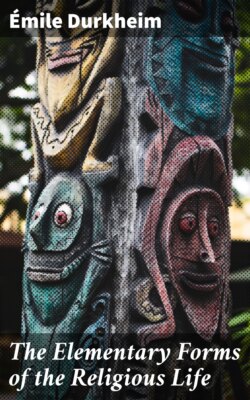Читать книгу The Elementary Forms of the Religious Life - Durkheim Émile - Страница 12
На сайте Литреса книга снята с продажи.
IV
ОглавлениеHowever, this definition is not yet complete, for it is equally applicable to two sorts of facts which, while being related to each other, must be distinguished nevertheless: these are magic and religion.
Magic, too, is made up of beliefs and rites. Like religion, it has its myths and its dogmas; only they are more elementary, undoubtedly because, seeking technical and utilitarian ends, it does not waste its time in pure speculation. It has its ceremonies, sacrifices, lustrations, prayers, chants and dances as well. The beings which the magician invokes and the forces which he throws in play are not merely of the same nature as the forces and beings to which religion addresses itself; very frequently, they are identically the same. Thus, even with the most inferior societies, the souls of the dead are essentially sacred things, and the object of religious rites. But at the same time, they play a considerable rôle in magic. In Australia[74] as well as in Melanesia,[75] in Greece as well as among the Christian peoples,[76] the souls of the dead, their bones and their hair, are among the intermediaries used the most frequently by the magician. Demons are also a common instrument for magic action. Now these demons are also beings surrounded with interdictions; they too are separated and live in a world apart, so that it is frequently difficult to distinguish them from the gods properly so-called.[77] Moreover, in Christianity itself, is not the devil a fallen god, or even leaving aside all question of his origin, does he not have a religious character from the mere fact that the hell of which he has charge is something indispensable to the Christian religion? There are even some regular and official deities who are invoked by the magician. Sometimes these are the gods of a foreign people; for example, Greek magicians called upon Egyptian, Assyrian or Jewish gods. Sometimes, they are even national gods: Hecate and Diana were the object of a magic cult; the Virgin, Christ and the saints have been utilized in the same way by Christian magicians.[78]
Then will it be necessary to say that magic is hardly distinguishable from religion; that magic is full of religion just as religion is full of magic, and consequently that it is impossible to separate them and to define the one without the other? It is difficult to sustain this thesis, because of the marked repugnance of religion for magic, and in return, the hostility of the second towards the first. Magic takes a sort of professional pleasure in profaning holy things;[79] in its rites, it performs the contrary of the religious ceremony.[80] On its side, religion, when it has not condemned and prohibited magic rites, has always looked upon them with disfavour. As Hubert and Mauss have remarked, there is something thoroughly anti-religious in the doings of the magician.[81] Whatever relations there may be between these two sorts of institutions, it is difficult to imagine their not being opposed somewhere; and it is still more necessary for us to find where they are differentiated, as we plan to limit our researches to religion, and to stop at the point where magic commences.
Here is how a line of demarcation can be traced between these two domains.
The really religious beliefs are always common to a determined group, which makes profession of adhering to them and of practising the rites connected with them. They are not merely received individually by all the members of this group; they are something belonging to the group, and they make its unity. The individuals which compose it feel themselves united to each other by the simple fact that they have a common faith. A society whose members are united by the fact that they think in the same way in regard to the sacred world and its relations with the profane world, and by the fact that they translate these common ideas into common practices, is what is called a Church. In all history, we do not find a single religion without a Church. Sometimes the Church is strictly national, sometimes it passes the frontiers; sometimes it embraces an entire people (Rome, Athens, the Hebrews), sometimes it embraces only a part of them (the Christian societies since the advent of Protestantism); sometimes it is directed by a corps of priests, sometimes it is almost completely devoid of any official directing body.[82] But wherever we observe the religious life, we find that it has a definite group as its foundation. Even the so-called private cults, such as the domestic cult or the cult of a corporation, satisfy this condition; for they are always celebrated by a group, the family or the corporation. Moreover, even these particular religions are ordinarily only special forms of a more general religion which embraces all;[83] these restricted Churches are in reality only chapels of a vaster Church which, by reason of this very extent, merits this name still more.[84]
